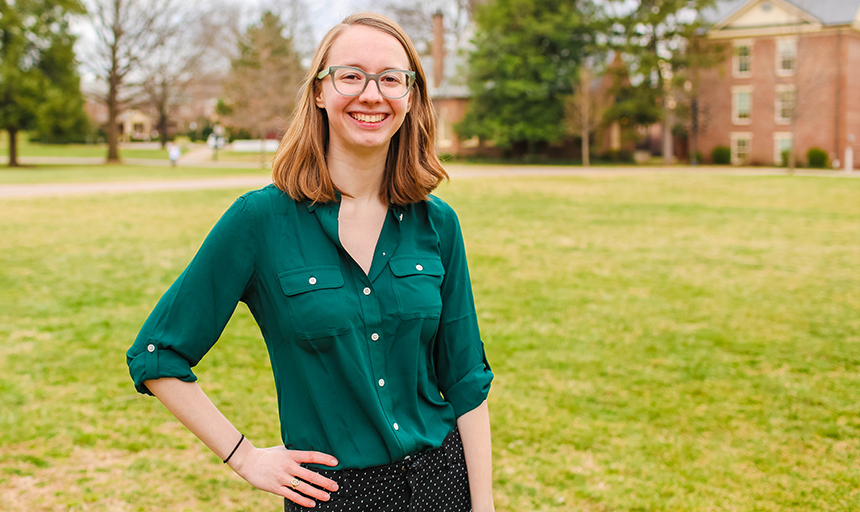Shields heads back to Germany with Fulbright
April 13, 2017

Stephanie Shields '17 has been selected for a 2017-18 Fulbright U.S. Student Award to Germany. She will be doing research in the lab of Dr. Lutz Wiegrebe at Ludwig-Maximilians-Universität München in Munich, Germany. Shields will contribute to the work of Dr. Wiegrebe on vocal learning - the capacity to learn to produce new sounds through imitation - in the bat Phyllostomus discolor.
Shields is a psychology major with a neuroscience concentration and a German minor. After her Fulbright work, Shields plans to earn a Ph.D. in neuroscience.
Shields, who is from Yorktown, has been conducting research at Roanoke with Dr. David Nichols for several years, and her work resulted in one first-author publication and another first-author manuscript submitted for publication. Her published work was done as part of Dr. Nichols's Research Seminar in Neuroscience. The group investigated the merits of using individual electrodes versus electrode caps in undergraduate settings to provide guidance to instructors trying to decide which type of equipment to invest in. Their work was published in the Journal of Undergraduate Neuroscience Education.
"My research career at Roanoke College would not be what it is without Dr. Nichols," Shields said. "He always pushes me to improve and has been an invaluable source of wisdom. His office is one of my favorite places of refuge on campus, and I know I can always go there when I need help figuring out a problem or learning a new research technique or when I need some sage advice."
Shields has also worked as a qualitative analyst for Brain Injury Services of Southwest Virginia. She analyzed online sessions designed for veterans who have brain injuries, evaluated topics brought up during class and how much time was spent discussing topics relevant to the goals of the program, and wrote reports on what worked well or needed improvement in the class.
My research career at Roanoke College would not be what it is without Dr. Nichols. He always pushes me to improve. His office is one of my favorite places of refuge on campus, and I know I can always go there when I need help figuring out a problem or learning a new research technique or when I need some sage advice.
Stephanie Shields ’17
Last year, Shields spent the summer with the German Academic Exchange Service's Research Internships in Science and Engineering. There in Hamburg she was a research intern at the Universitätsklinikum Hamburg-Eppendorf (UKE). She was one of about 300 selected for the program, from 1,697 applications. She was paired with a Ph.D. student on a project using electroencephalography (EEG) neurofeedback training and the potential for subjects to learn to modulate neural activities related to memory. She assisted with data collection for the elderly training group and led data collection for younger comparison group. Shields contributed to the project in a variety of ways, even improving the preprocessing script to improve the quality of their data.
"The preprocessing step is essential in obtaining valid results, so being able to work on that problem and to make a meaningful contribution to its solution was very rewarding," Shields said.
About her experience at Roanoke, Shields said, "My professors have inspired me to go after opportunities that I never imaged I would have. They've helped me become a better scholar, a better researcher, and a better, more capable person. I'm incredibly grateful for the knowledge that they've shared with me and the encouragement that they've given me. During the Fulbright application process in particular, Professor Jenny Rosti, Dr. James Ogier, Dr. Darcey Powell, and my research and academic advisor Dr. David Nichols were instrumental."